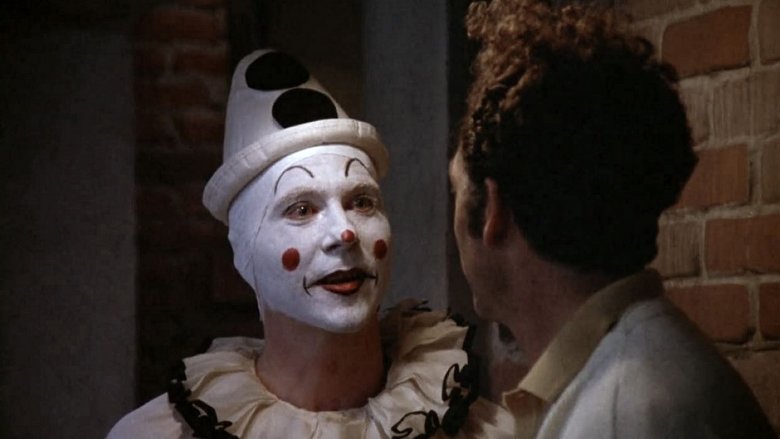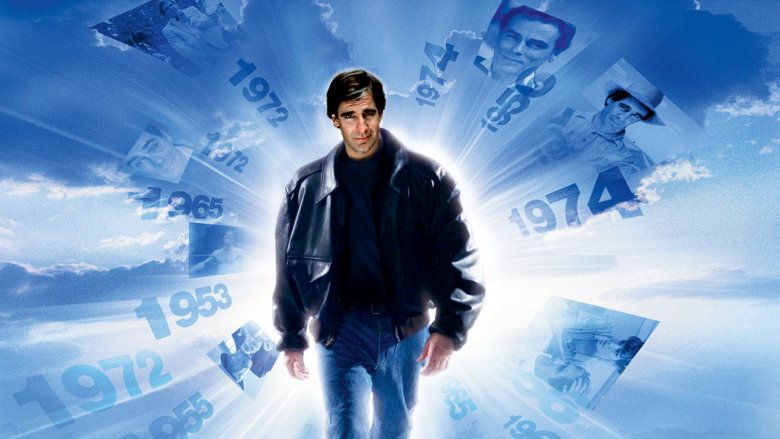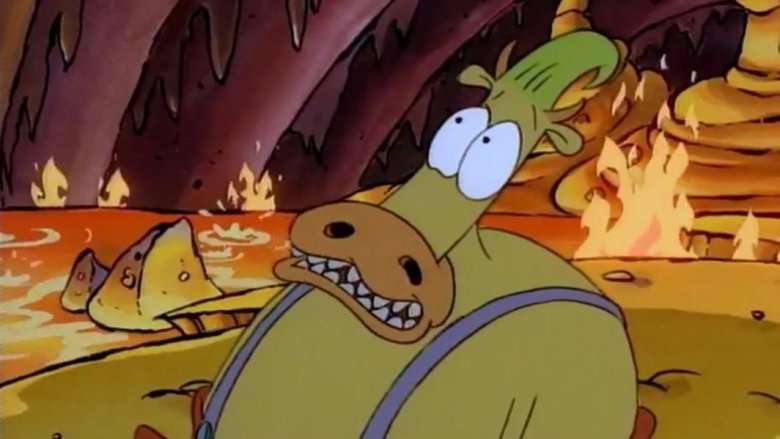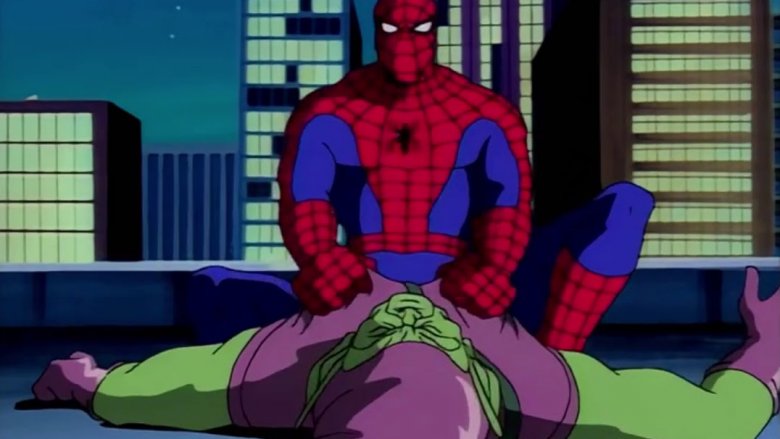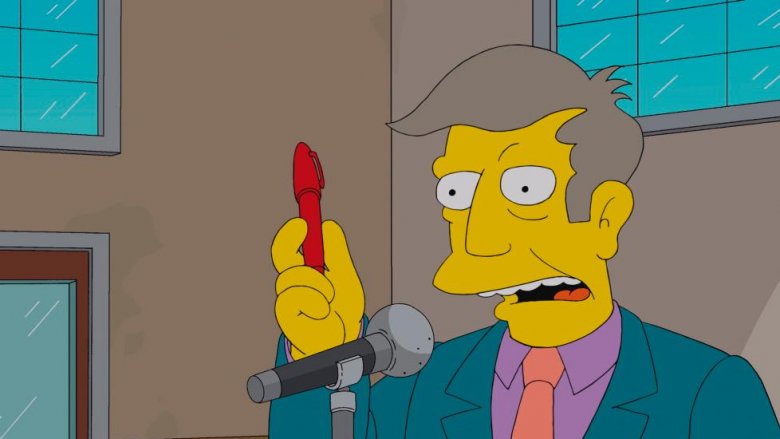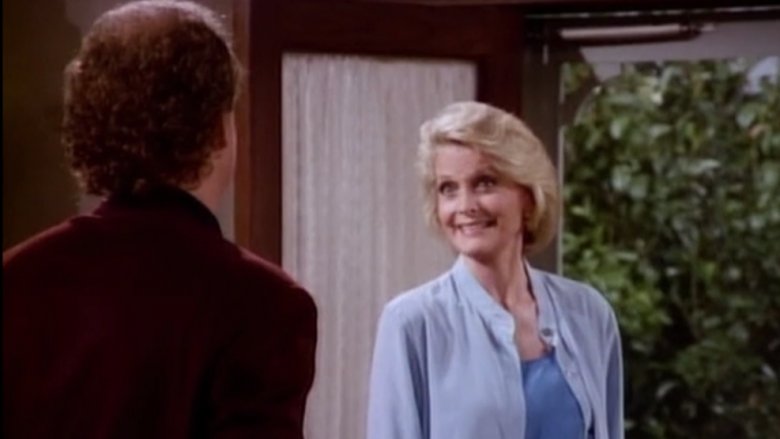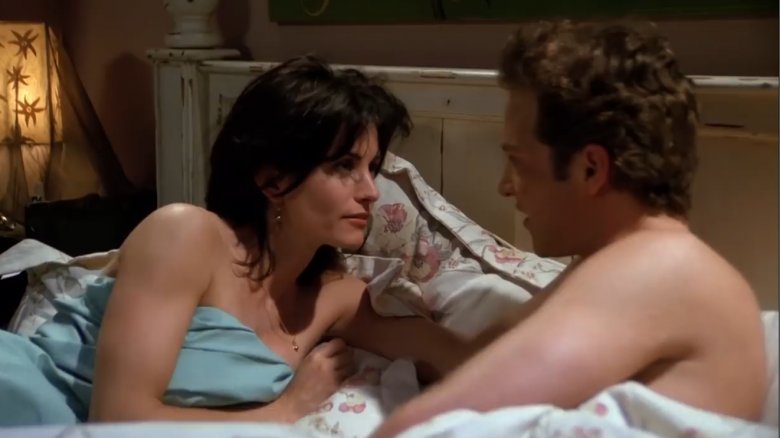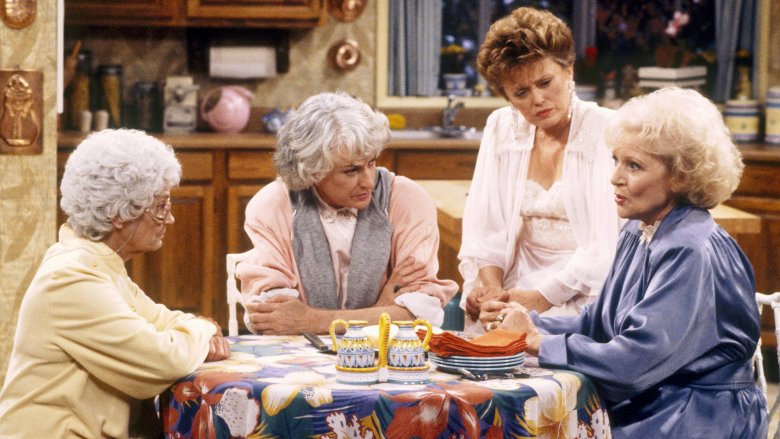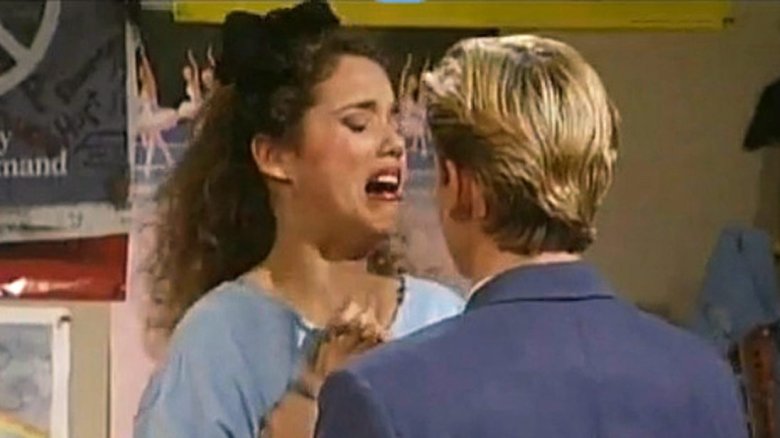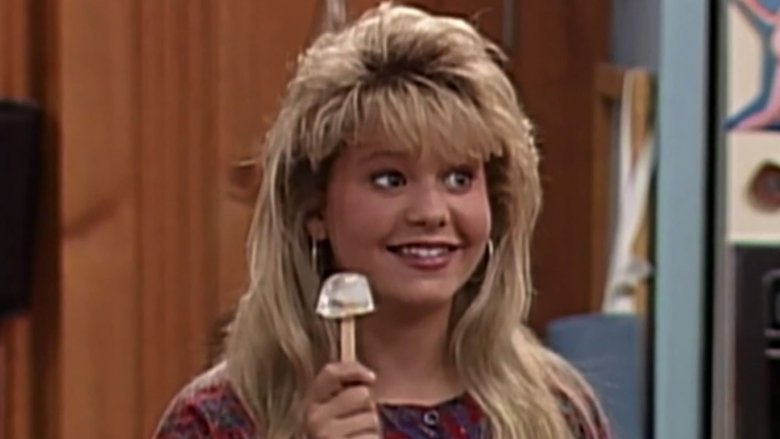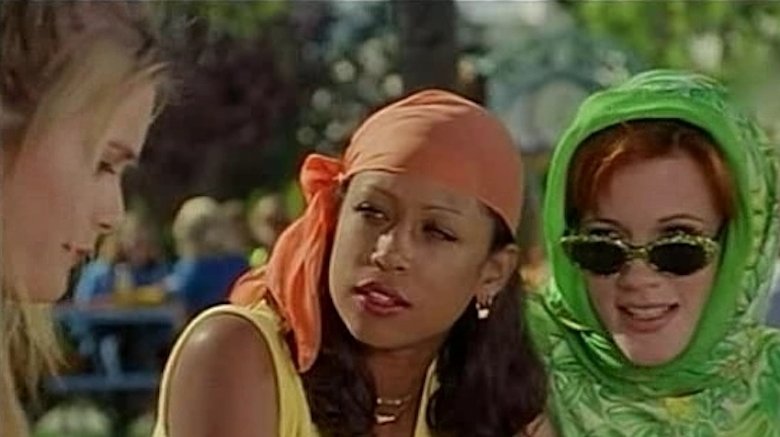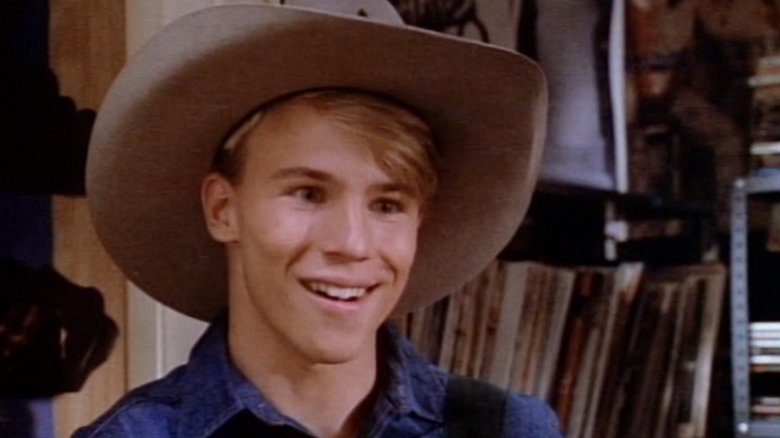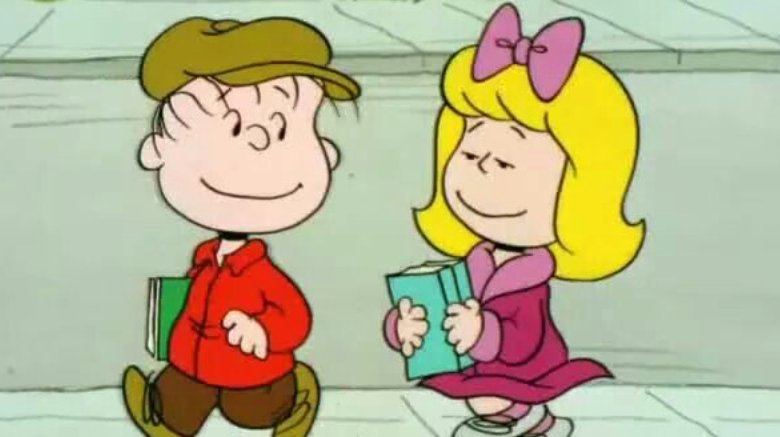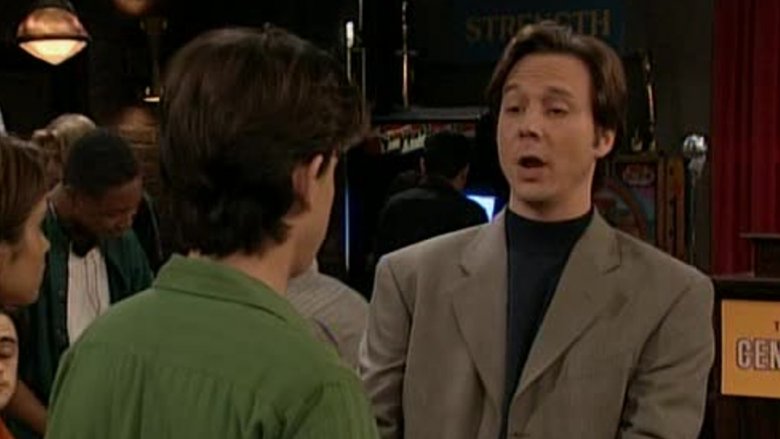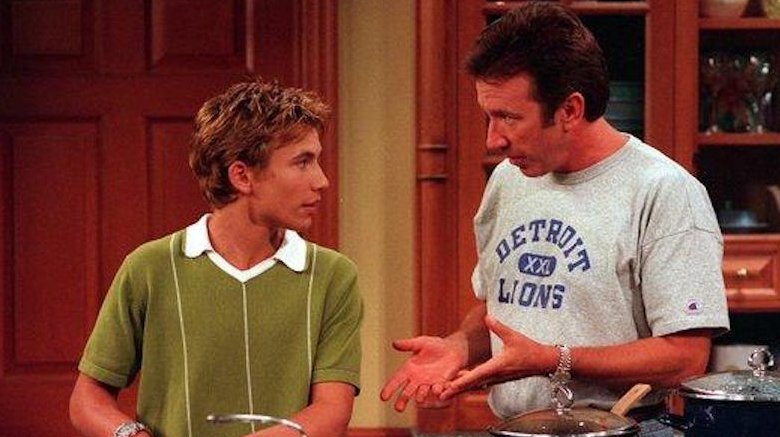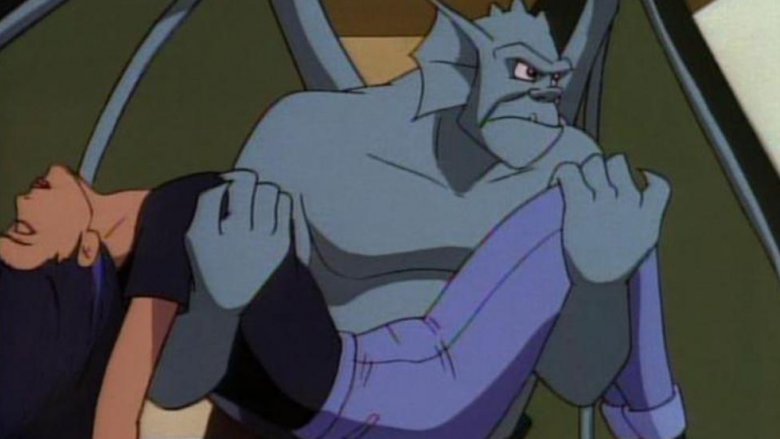The Darkest Episodes From '90s TV Shows
These days, popular TV shows go dark on a regular basis. Today's television landscape is more diverse than ever, and if you get tired of watching an old-fashioned sitcom, you're only one click away from the gory post-apocalyptic landscapes of The Walking Dead.
However, while your memories of '90s TV might seem quaint and fluffy in comparison, don't be fooled. When the shows you're now so nostalgic about weren't busy wrapping up every episode in a neat little bow, they plunged you into all kinds of downers. Ready to relive some childhood nightmares?
'Changing Nature' - Dinosaurs
On the surface, Dinosaurs seems like an average sitcom about a working-class dad named Earl Sinclair, his wife, Frannie, and their three kids. The Sinclairs have a lot in common with the Simpsons, other than the fact that they're prehistoric reptiles created by the Jim Henson Company. Yeah ... Dinosaurs was a weird show, but it had a devoted following that kept it on the air for 65 episodes. Dinosaurs did delve into social messages, but always maintained such a fun, uplifting tone that looking back, you almost forget that the show ended with the entire family dying a grisly, cold, heartbreaking death.
In the series finale, "Changing Nature," an ice age kicks off. To add some salt in the wound, it's shown that the worldwide climate catastrophe is Earl's fault — or, well, the fault of Earl's company. Once snowflakes starts falling, you know it's all over. The episode closes with the Sinclair family huddled together during the blizzard, figuring that hey, "Dinosaurs have been on this Earth for 150 million years and, it's not like we're gonna just disappear, right?"
Cue tears, wailing, sobbing. It's a depressing ending, but as the AV Club points out, it's an incredibly effective one: "Changing Nature" has a stirring impact, and absolutely sells its message about the dangers of environmental irresponsibility. Still, it's sad to know that Baby Dinosaur will never go to first grade.
'One Beer' - Tiny Toons Adventures
Hey, Tiny Toons Adventures! Every '90s kids watched that show! Remember the "Hollywood Plucky" episode? What about "Acme Acres"? Or who else remembers "One Beer," the sketch where all the characters become alcoholics and then died in a drunk driving accident?
No joke, no exaggeration, it happened. In the most bizarrely exaggerated PSA stunt of all time, the cheerful cartoon trio of Buster Bunny, Plucky Duck, and Hamton J. Pig find "one beer" in the fridge, and upon having a single drink — nay, splitting a single drink three ways — all of them are transformed into booze-addicted caricatures. Which is weird, considering that most people's first beers don't go down that smoothly. Guess the Tiny Toons weren't drinking Milwaukee's Best Ice.
Anyway, when the inebriated animal kids decide to go drunk driving, they steal a police car, lose control, and hurtle over the side of a cliff. Sure, the whole thing is revealed to be a "prank" afterward, with the dead characters taking off their angel costumes. However, according to Dorkly, Fox ended up banning the segment anyway. Which isn't surprising, since parents would have been furious if their kids started screaming in anguish anytime dinner guests brought over a six pack.
'The Boogieman' - Quantum Leap
When Scott Bakula's Dr. Sam Beckett got trapped leaping through time, it made for one of the most cleverly constructed "feel-good" shows of all time. Seriously, that memorable theme song could make even the hardest person crack a smile. Every episode, Sam jumped into a new person's body, in a different period in the 20th century, in order to "put right what once went wrong." Once the historical catastrophe was averted, he'd leap into a new person, say his famous "Oh boy" catchphrase, and begin the next adventure. Along the way, he was aided by his best friend, Al, a hologram from the future.
Due to its time travel format, Quantum Leap jumped freely between many genres, but it was always family friendly. Well, except for the one haunted house episode which gave all the younger viewers nightmares. According to Popoptiq, the episode was titled "The Boogieman." After leaping into the body of a horror novelist, Sam is surrounded by weird supernatural occurrences and is unable to prevent people from dying all around him. To top off all the B-horror movie madness, it's revealed that Sam's holographic buddy Al has been possessed by the Devil — yes, Satan himself — who then tries to murder Sam. It gets intense, but don't worry. Because it's Quantum Leap, things turn out okay in the end, and the show even throws in a fun Stephen King reference.
'Into that Good Night' - Roseanne
The extinction of the Dinosaurs was probably the most depressing finale ever, but Roseanne's downer ending comes pretty close. The heart of Roseanne was always the working-class relationship between the title character and her husband, as they struggled to pay bills, raise a family, and get by. Until the final season, according to Uproxx, where a surprise lottery win turns the family into millionaires, thereby leading to a bizarre 22-episode run of wealthy celebrity hijinks. That's weird enough, but then, the series finale hits viewers with the biggest plot twist of the series: The whole last season was a novel written by Roseanne, who never won the lottery at all.
Hold on tight because it gets worse. Apparently, Roseanne's new fiction writing habit is her way of coping with the loss of her beloved husband, Dan, who actually died of a heart attack in the previous season. Everything that's happened since Dan's death is just a dream. So in about two minutes, the entire run of show goes from comedy to tragedy.
For what it's worth, the 2018 Roseanne revival showed Dan to still be alive, according to Screen Rant. Of course, then Roseanne Barr got all real-life racist and got her show canceled, so that's a different kind of dark.
'Over the Edge' - Batman: The Animated Series
Hey, there's a reason he's called the "Dark" Knight. Though all the kids loved Batman: The Animated Series, what made the show a classic was its courageous exploration of mature themes like trauma, loss, abuse, identity crises, and more. However, the show's most intense episode was "Over the Edge," which shows a horrific implosion in the relationship between Batman and his eternal ally, Commissioner James Gordon. The fallout occurs when Gordon's daughter, Barbara, is killed by the Scarecrow. As she dies in her father's arms — a long, horrible moment that viewers are forced to observe — Gordon blames Batman and swears to destroy everything the Dark Knight stands for.
It's thrilling, but painful to watch. Sure, the Joker's a scary guy, but even his machinations can't compare to the gut-wrenching sight of Jim Gordon raiding the Batcave and blowing up the Batmobile. As written by the AV Club, the episode is eventually revealed to be a dream sequence experienced by Barbara, who is still alive. Nonetheless, mainstream superhero cartoons don't get much darker than this.
'Stevil' - Family Matters
Okay, so nothing turns a wholesome family sitcom into a terrifying creepshow like a good Halloween episode. However, the "Stevil" episode of Family Matters is horrifying enough that Freddy Krueger would probably run away, crying into his claws.
As described by Decider, "Stevil" is the name of a demonically possessed ventriloquist dummy who just happens to look exactly like Urkel, the show's nerdy star character. Now, ventriloquist dummies are already creepy. Just ask the generation of kids who grew up with The Twilight Zone. But this evil Urkel doll is like something crafted in the bowels of Hell. Stevil's Wishmaster-esque voice would be enough to make countless children hide under the bed, and after he comes to life, the dummy proceeds to systematically torture, play with, and murder the entire cast of the show. So yes, for one episode, Family Matters literally turned into a slasher movie.
Sure, sure, it ends up being a dream sequence, and these episodes always get retconned. But hey, try telling that to the traumatized young Urkel fan who will now refuse to wear suspenders, ever again. You can't just shout "dreaming!" after every horrifying episode and have it be fine.
'To Heck and Back' - Rocko's Modern Life
Depictions of demonic figures within children's entertainment used to be a more normal occurrence. Listen, the "Night on Bald Mountain" segment of Fantasia is like Dante Alighieri's Inferno in cartoon form. And Krampus? C'mon. However, times have changed, and by the '90s, children's TV networks wanted to avoid showing things like red monsters holding pitchforks. Despite this, Rocko's Modern Life sneaked one past the censors, simply by calling Hell "Heck."
Hellish imagery aside, "To Heck and Back" is a seriously disturbing episode, which features the character Heffer choking on chicken bones, dying, and then trying to go to Heaven ... only to be dragged down to Heck. It seems that Heffer's gluttonous ways have imprisoned him in the dark realm, and he'll now have to spend eternity watching video footage of himself eating insane amounts of food. Sure, Heffer ends up escaping from this fate, but he doesn't appear to learn his lesson, so it seems likely that a return trip to Heck may await him in the future. Maybe he needs a visit from the three ghosts of gluttonous past, present, and future?
'Turning Point' - Spider-Man: The Animated Series
One of the landmark moments in comic book history occurred in Amazing Spider-Man #121, when the Green Goblin threw Peter Parker's girlfriend Gwen Stacy off a bridge, and the webslinger failed to save her. After that comic, superhero stories changed forever. No one was safe, not even a hero's loved ones. Though the '90s Spider-Man cartoon never could have gotten the infamous "neck snap" scene past the censors, writer John Semper captured the spirit of the story in surprisingly gritty detail.
In "Turning Point," the Green Goblin captures Mary Jane Watson — whom Peter marries, in the comics — and throws her off a bridge. While MJ doesn't quite "die," she does disappear into a dark portal and becomes trapped in limbo, presumably for eternity, which might be even worse. An anguished Spider-Man then tries to murder the Green Goblin in cold blood, only for the Goblin to instead get sucked into the same spinning portal. Before Spidey can pursue them (which might not be a great idea), the portal closes. Boom. Archenemy and greatest love, gone forever.
So, just like the comics, Spider-Man fails to save the woman he loves, opening fresh wounds on his prior failure to save Uncle Ben. There's no blood, no bones, no gravestones, but it's seriously dark stuff.
'Consider Me Gone' - Alf
Alf was a weird alien, and his taste for eating cats could be problematic, but otherwise, he was a pretty lovable dude. It's a shame that the U.S. government's "Alien Task Force" was so dedicated to kidnapping Alf and that they so badly wanted to subject him to tortures such as freezing, electrical shock, and dissection, according to Junkee. These horrific machinations prompted the Tanner family to take Alf into the fold and protect him as one of the family. Heartwarming stuff, right?
Wrong. According to Complex, Alf's final episode saw the title character being called up by his fellow aliens, finally allowing him to leave Earth. But unlike E.T., Alf doesn't get to go home. He misses his flight, and the Alien Task Force finally catches up to him, surrounding him with guns. Fade to black.
The ending was supposed to be a cliffhanger, but the show ended there, with viewers forced to imagine the alien they'd come to love being cut open like the grey guy in Alien Autopsy. A follow-up TV movie came out in 1996, but by that point, everyone had mourned for the cat-eating alien for too long. Man, '90s series finales were rough.
'Whacking Day' - The Simpsons
The Simpsons has been on TV so long that they've done almost any storyline imaginable. However, the show's darkest moment didn't occur during one of those Halloween "Treehouse of Horror" segments. Instead, this disturbing little nugget was hidden in an otherwise innocuous episode called "Whacking Day." ("Whacking Day" is for beating snakes to death with sticks, not whatever else you were thinking.)
See, you might've thought Principal Skinner was a mean guy, but it turns out he's also an attempted murderer. When the local Superintendent comes to inspect the school, Skinner decides he has to keep all his more rambunctious students from causing trouble. So he promises them free mountain bikes, guides them under the school, and locks them in Utility Basement B. That'd be bad enough, but Skinner then totally forgets about the boys ... for days. Days! Bart escapes, but the rest of the kids spend the week (or longer) in this basement, with no water. Somehow, they survive the ordeal. Skinner gives them real mountain bikes as an apology, but yeah, no dice: After pulling that locked door crap, it's surprising the kids ever listen to him.
'The Darkness and the Light' - Star Trek: Deep Space Nine
Star Trek is known for being a bastion of hope and optimism, and while the '90s series Deep Space Nine mostly stayed true to that vision, it wasn't afraid to test the boundaries. The series takes place near the planet Bajor, which has only recently been freed from decades of tyrannical occupation by the Cardassians, a society of reptilian invaders. Political and religious allegories abounded, and one of the show's prominent heroes was Kira Nerys, a former Bajoran freedom fighter played by Nana Visitor.
... or was she a terrorist? Deep Space Nine was never afraid to challenge moral assumptions. While the Cardassian occupation itself was unquestionably immoral, the episode "The Darkness and the Light" went deeper than most TV programs ever would, by also holding up a mirror to Kira's actions as a rebel, according to Tor. Overall, the show mostly sides with Kira: Her people were being oppressed, and she had to fight, even if it meant spilling Cardassian blood. However, DS9's writers pointedly examine the fact that Kira is so unrepentant, particularly when she's interrogated by a Cardassian who claims he did everything he could to spare Bajoran lives.
No easy answers here, and that's exactly why fans loved DS9.
'Bullets Over Bel-Air' - Fresh Prince of Bel-Air
There are few shows that epitomize the '90s as much as The Fresh Prince of Bel-Air. Everyone who grew up in that decade knows the lyrics of the Fresh Prince theme song by heart, and the series introduced the world to Will Smith, the movie star of all movie stars. Surprisingly, even though Fresh Prince was a sitcom, E! News points out that the series wasn't afraid to explore deeper issues, particularly in the episode "Bullets Over Bel-Air."
Basically, what happens here is that Will and Carlton are held up at gunpoint, and Will takes a bullet to save Carlton's life. Will doesn't die, but he does get hospitalized. Later on, Carlton visits Will at his hospital bed, and Carlton tells Will that he bought a gun to protect them if it ever happens again. Rather than being impressed, Will is furious, and he demands that Carlton leave the gun behind. Carlton stomps off but does as Will asks. The scene ends with Will choking up as he empties the bullets from the chamber.
The whole sequence is as emotional as a TV program can get. While Fresh Prince went back to being funny after that, these darker moments are some of the big ones fans remember today.
'The Opera' - Seinfeld
Most sitcoms have their dramatic "family hug" moments, but Seinfeld avoided them like the plague. From start to finish, Seinfeld was snarky and witty, and treated every situation like a joke, even when characters died from licking toxic envelopes. However, in one episode from 1992 the show got a little too real for comfort.
"The Opera" is all about the character of Crazy Joe Davola, who'd seem more at home in Silence of the Lambs than Monk's Cafe. The insanity starts when Crazy Joe phones up Jerry, leaving a message where he threatens to "put the kibosh on" him. Soon, we find out that Crazy Joe has also been stalking Elaine, plastering countless photographs of her face across his apartment walls a la Kilgrave in Jessica Jones. From there, he spends the rest of the episode acting like a genuine serial killer, finally disguising himself in a clown costume and scaring Kramer. The laugh track only makes the whole thing even more disturbing.
The worst part? At the end of the episode, Crazy Joe is still at large. Spin-off potential? Yeah, maybe for a horror movie.
'Slow Tango in South Seattle' - Fraiser
Frasier is one of the most low-key sitcoms of all time. Just about the complete opposite of the rowdy, ensemble-driven Cheers, the show it was spun off from, Frasier found fancy and erudite Frasier Crane (Kelsey Grammer) living in quiet, rainy Seattle, working as a psychiatrist on a radio call-in show and hanging out in a coffee shop with his even fussier brother, Niles (David Hyde Pierce). A lot of plots focused on the title character's love life: Frasier may have been middle-aged, divorced, balding, and self-absorbed, but none of that was going to stop him from trying to bed as many beautiful and intelligent women as possible.
The 1994 episode "Slow Tango in South Seattle" depicted a creepy and problematic sexual conquest in Frasier's life. An old patient (John O'Hurley — Seinfeld's J. Peterman) who Frasier helped to conquer writer's block has apparently lifted the story of Frasier losing his virginity and turned it into a best-selling work of romantic fiction. At first enraged by this violation of privacy, Frasier instead sets out to track down his first partner and thank her for making a man out of him. What's weird is that the woman was his 40-year-old piano teacher, and she seduced Frasier when he was but a lad of 18.
'The One with the Ick Factor' - Friends
Friends is an iconic sitcom, a definitive '90s TV show that purported to depict the life of a single twenty-something looking for love in the big city and experiencing the phenomenon of that particular time in life of hanging out with a friends group that becomes a de facto family. That's a reputation that Friends slowly leaned into because it was a pretty weird show during its first season (1994-95). For example, Ross had a pet monkey, which is not a normal thing people did in the go-go '90s. Also, there's a whole episode where Monica deflowers a minor. Really.
At least producers knew they were getting weird — they titled it "The One with the Ick Factor," after all. Monica, years from finding true love with Chandler, dates a younger guy named Ethan — he's a "senior" in what Monica thinks is college, and so she lies and tells him she's 22, although she's actually 26. They soon physically consummate their relationship, which is especially meaningful for Ethan, as it's his first time. After the deed is done, Monica tells Ethan her real age. That's when he admits he told a lie, too: He's not a senior in college ... he's a senior in high school, and also he's 17. That's a dealbreaker for Monica, who somehow avoids prison.
'72 Hours' - The Golden Girls
More than 25 years after it went off the air, The Golden Girls remains a cult classic. The show, one of the few to ever air about women "of a certain age," followed an undeniable formula. Miami housemates Dorothy (the sarcastic one), Rose (the dimwitted one), Sophia (the unfiltered one), and Blanche (the amorous Southern belle) dated, dealt with the perils of aging, sass-mouthed each other — generally a pointed comment about Blanche's supposed promiscuity — and ate a cheesecake in the middle of the night. The Golden Girls was a joyful, light-hearted show, but it also delivered an episode about the AIDS crisis.
The 1990 installment "72 Hours" found Rose (national treasure Betty White) grappling with the news that the blood transfusion she'd received during a surgery years prior may have been tainted with HIV. So off she goes to get tested ... and must wait 72 frightening hours for the result. Sweet Rose endures mental and emotional anguish throughout, and at one point declares that she's a "good" person and doesn't deserve to get AIDS, as opposed to say, Blanche, whom she implies would be more likely to contract the disease because of her high level of sexual activity. Blanche thoughtfully replies, "AIDS is not a bad person's disease, Rose. It is not God punishing people for their sins." Powerful statement made ... and Rose didn't get AIDS because it was a comedy show, after all.
'Jessie's Song' - Saved By the Bell
Saved By the Bell exists in a bizarro version of the '90s where teens zinged each other with insults that sound like they came from old vaudeville routines, attended a school with an 8-to-1 student-to-teacher ratio, and experienced zero repercussions for constantly scamming their principal, who is also their best friend. Also, Zack Morris, their leader, could freeze time, and Screech built the most advanced robot in world history. Bayside High was a strange place to be sure, but it was nearly torn asunder by the cold claw of addiction in the November 1990 episode "Jessie's Song."
Overachiever Jessie bites off more than she can chew trying to balance her high level of commitment to school in addition to Hot Sundae, the "I'm So Excited"-covering pop group she's formed with Kelly and Lisa. There aren't enough hours in the day, so Jessie turns to cocaine pills for energy and then, in a terrifying TV moment, she experiences a panic attack and scream-sings "I'm So Excited" ... which segues into her speak-crying "I'm so scared" into Zack's sympathetic arms. Okay, all that happens except for the cocaine — Jessie got briefly hooked on caffeine pills, not hard drugs. While the climax is a bit much — a caffeine binge would result in agitation and a headache, not a full-on freak-out — it does make a point about how kids like Jessie can easily burn out trying to meet high expectations.
'Shape Up' - Full House
Sitcom episodes about important topics can come across as heavy-handed if only due to juxtaposition: When a usually inane, superficial sitcom tackles a serious issue, it can lead to viewer whiplash. That's what happened with the 1990 episode Full House episode "Shape Up" — which nobly demonstrated eating disorder warning signs to parents of teens and tweens (amid its usual cute kid jokes and catchphrase-based humor).
D.J. Tanner (Candace Cameron) scores an invite to BFF Kimmy Gibbler's pool party, and realizing she'll have to wear a swimsuit in public she feels some toxic body shame. She becomes obsessed with losing weight as quickly as possible, and as the episode unfolds, she develops an eating disorder. D.J. posts photos of rail-thin models on the fridge to discourage herself from eating, eschews cake in favor of "ice on a stick," feeds her sandwich to the dog, and then stops eating altogether. The family realizes she has a serious problem when she collapses after working out too hard on a treadmill. Rather than seek treatment for this serious medical and psychological disorder, dad Danny Tanner tells D.J. that "what's on the inside is what matters" and she's immediately cured and announces her intention to attend the pool party and just have fun. Yikes, Full House.
'None for the Road' - Clueless
Clueless, the 1995 movie, was so popular with '90s teens that ABC (and later UPN) adapted it into a TV series. It actually ran for three seasons, and a remarkably high number of film cast members reprised their roles on the small screen, including Stacey Dash (Dionne), Donald Faison (Murray), and Elisa Donovan (Amber). Rachel Blanchard took over for Alicia Silverstone as winsome Cher Horowitz, and that's not the only big change when Clueless went small. As the movie was based on Jane Austen's Emma, the show ran out of source material pretty quickly and had to invent new situations for its characters, which included standard teen TV fodder, including a "very special episode" in 1999 about the perils of drunk driving.
Cher's friends throw her a huge 18th birthday party. How huge — and how '90s — was it? *NSYNC shows up! Anyway, regular characters Cher, Murray, Sean (Sean Holiday), along with Cher's boyfriend of the moment Adam (Breck Wilson), party hard and get thoroughly underage drunk, and then everyone but Cher tries to drive home. There's an accident. While Murray walks away, Sean and Adam both get hospitalized, and soon after, Adam dies from internal injuries. Never did a teenage boy drink and drive himself to death in Emma.
'The Next Fifty Years' - Beverly Hills, 90210
Before it became a soap opera for young people about young, sun-kissed Californians hooking up with, cheating on, and breaking up with each other, Beverly Hills, 90210 was just a fish-out-of-water show (Brandon and Brenda Walsh moved to SoCal from Minnesota) about goofy high school kids who happened to have excellent haircuts and designer clothes. One plot thread involved cool and popular David Silver still hanging around with his sort-of-nerdy old pal Scott Scanlon. But during Season 2, Scott's portrayer, Douglas Emerson, wanted to leave the show ... so the writers wrote him out in a very big way. Scott's mom asks David and Donna (Tori Spelling) to plan Scott's big 16th birthday party, and they throw a big bash. But Scott, ever the misfit, sneaks away and rummages through a desk drawer where he finds a gun. He plays around with it, and, shockingly, accidentally shoots himself dead. Yes, 90210 had a teenage character die on his birthday.
'Why, Charlie Brown, Why?'
This isn't an episode of a regular television series — it's a Peanuts special, starring Charlie Brown, Snoopy, Linus, and the gang. The Peanuts team unleashed a whopping 45 specials over the years, including annually re-aired classics like It's the Great Pumpkin, Charlie Brown and A Charlie Brown Christmas. Well, there are only so many holidays to disappoint ol' Chuck, and by 1990 the topics evolved away from celebrations and toward leukemia.
See, there's a new girl in school named Janice with whom Linus makes friends. One day, she gets sick and leaves school ... and doesn't come back. Linus and Charlie Brown go visit her in the hospital, where she's receiving chemotherapy treatments for leukemia, an especially terrible and aggressive form of cancer that attacks the blood and bone marrow. She's handling it okay, but it's Linus who breaks down, raging at the cruelty of the universe by asking "Why?" to Charlie Brown, who has no easy answers. The good news: Janice recovers and comes back to school. The bad news: She lost her hair from the chemo, and a schoolyard bully makes fun of her. This is some very dark stuff for a franchise best known for a highly imaginative dog.
'Cult Fiction' - Boy Meets World
The "Boy" of Boy Meets World: Cory Matthews (Ben Savage), a Philadelphia tween (and eventually young man) who ostensibly meets some kind of thing about the world each episode. Usually, it's a relationship truth, as the show thoughtfully explored Cory's evolving interplays with his teachers, parents, romantic interests, and friends. Boy Meets World tracked the development of Cory's relationship with Topanga (Danielle Fishel) from classmate to crush to girlfriend to wife, but it's really a series about the bromance between Cory and his ride-or-die best pal Shawn (Rider Strong).
Probably their biggest and most bewildering trial is the time the impressionable Shawn got sucked into a cult. Suffering a personal slump, Shawn gets mixed up with "The Centre," a live-in church led by the charismatic Mr. Mac (Jerry Levine) where adherents spout creepy platitudes like "Laughter is a mask that denies the reality of a situation and reveals nervousness," and "A hug is a burst of pure love." Shawn gets hopelessly brainwashed into The Centre's way, and before long, Cory is struggling to find a way to deprogram his best friend (#TeenProblems), but the universe takes care of things. After Shawn's favorite teacher gets into a gruesome motorcycle accident, he snaps out of it.
'The Longest Day' - Home Improvement
Perhaps the most shocking thing on this 1996 episode of Home Improvement is that bumbling dad Tim "The Toolman" Taylor has to stop grunting like a caveman and act like a sensitive, modern, actual human man for a hot minute. He gets serious for the most serious reason possible: the possibility that his son has cancer.
Jonathan Taylor Thomas became the teen dream of millions with his role as wry and crafty middle child Randy Taylor. In "The Longest Day," innocent and jokey Randy goes in for a routine medical checkup. But later on, the doctor's office calls home and tells Randy's parents, Tim and Jill (Patricia Richardson) that there's a possibility that teenage Randy may have potentially fatal thyroid cancer. The family has to wait for test results to come in, making for plenty of time for two frightened parents to contemplate the death of their child, and for Randy to worry that he's going to die. Everything turns out fine, of course (he's just got a thyroid issue that can be solved with a daily pill), but "The Longest Day" is the longest Home Improvement episode.
'Deadly Force' - Gargoyles
Gargoyles was never a sunny show. The palpably gloomy series revolved around a group of gargoyles, who, while posing as stone-comprised building adornments in 20th-century New York City in the daytime, were actually fantastical creatures that had just spent 1,000 years in a state of perpetual petrification. It's their job to protect the city at night, and, it would seem, bear the weight of the world's ills on their shoulders and wax poetic in crisp, theatrical accents.
Gargoyles was an emotional slog, but never traumatizing. Well, 1994's "Deadly Force" is an exception. Against the backdrop of a mob-orchestrated theft and potential distribution of a crate of laser-based hand weapons, NYPD Detective (and friend to the Gargoyles) Elisa Maza is home cooking dinner one night when she's visited by gargoyle Manhattan. Having just seen a Western movie with a shooting duel scene, he's obsessed with guns and finds Elisa's service revolver in its holster and starts playing around with it, pretending he's a cowboy. Then it goes off in his hand and he accidentally shoots Elisa. Gargoyles does not look away, showing Elisa laying in a pool of her own blood, unconscious, on her own kitchen floor. She gets better, but still — that's a traumatizing TV moment.
